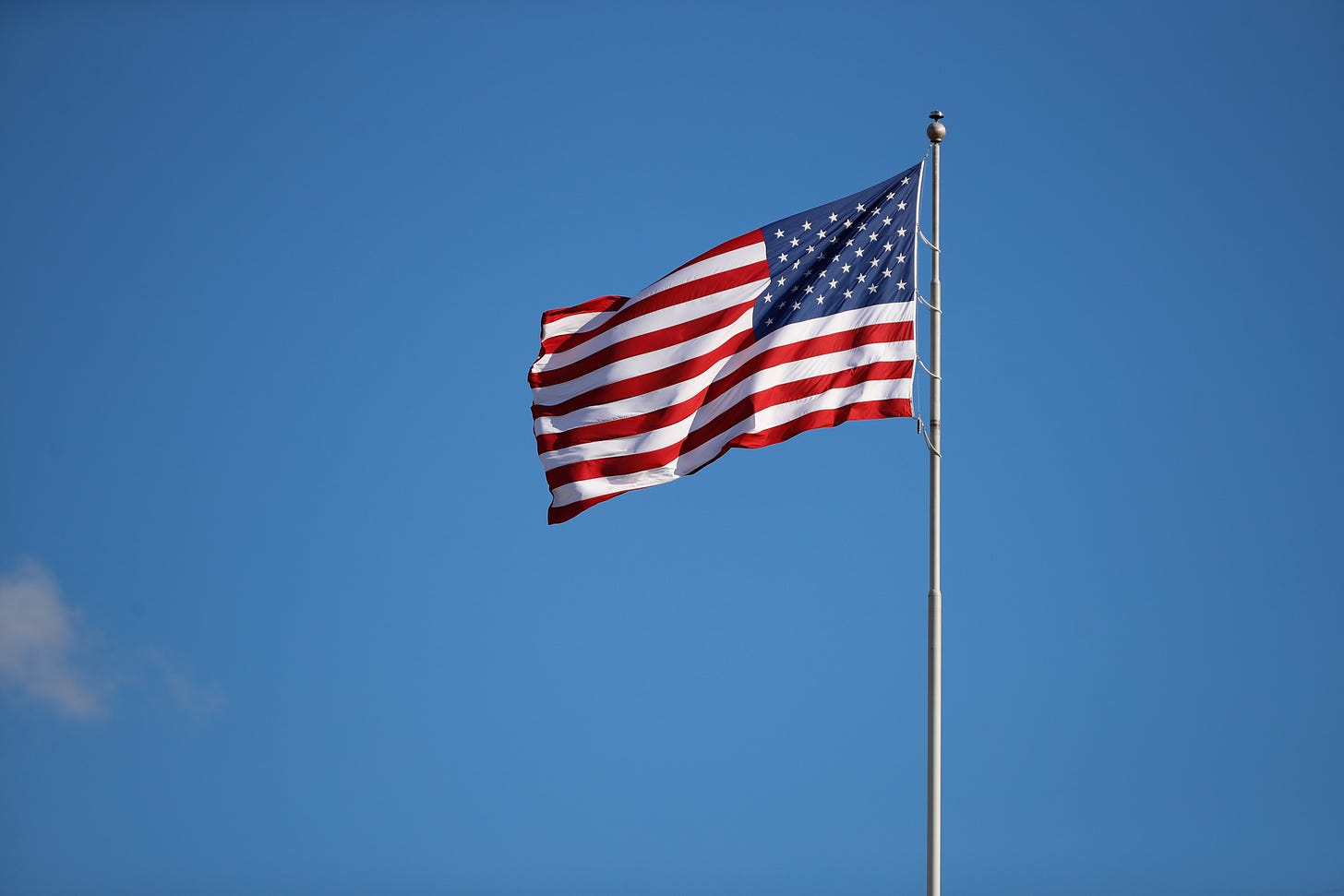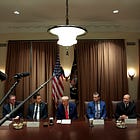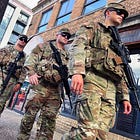“We need to conceive of democracy as something more revolutionary”
Osita Nwanevu on the imperative for a new American founding.
This special Saturday edition of Public Notice is made possible by paid subscribers. Become one ⬇️
“The truth is that those of us committed to defending democracy have more work cut out for us then we tend to acknowledge,” Osita Nwanevu writes in his new book, “The Right of the People: Democracy and the Case for a New American Founding.”
Nwanevu, a contributing editor at The New Republic, has been covering Donald Trump and American democracy for the past bleak decade. And one of his conclusions is that “to take democracy for granted as an ideal is to leave it vulnerable.” The lessons of the Trump years is, in part, that Americans do not necessarily support or value democracy — in part perhaps because they do not see democracy working for them.
Nwanevu’s book is an effort to explain and explore what democracy is, how American democracy has failed, and how it could be turned into something better and more inspiring. Though Nwanevu acknowledges the many weaknesses of our Constitution and of our country, his book is ultimately a hopeful call for renewal.
The democratic promise, he argues, is that ordinary people can take control of their own destiny from tyrants, authoritarians, kings, and oligarchs. If we work together, we can rule ourselves. That’s democracy’s promise — a promise, Nwanevu argues, that is still worth fighting for.
The following interview has been edited for clarity and length.
Noah Berlatsky
Could you talk a little about why you decided to write this book, and why you think it's important right now to think about democracy?
Osita Nwanevu
I've been covering politics now for about 10 years, and it struck me that one of the defining themes of the last decade of American politics has been democracy.
Trump comes in in 2017 with an Electoral College victory without having won the popular vote, the second time in the last 25 years that happened. And now we have a president who is openly acting as an authoritarian. I think it’s fair to call this a fascist administration. And that’s after 2020, when we saw an attempt to overturn a free and fair election, a real assault on our institutions, couched in anti-democratic rhetoric.
These are all primary reasons why democracy has been on the minds of most voters. But also, I covered the 2020 Democratic primary, and it struck me as I was writing about Medicare For All or the Green New Deal or a job guarantee or any of these programs — I kept having to say, “Even if Democrats win the election, even if they win Congress, these things probably aren’t going to pass for certain structural reasons.”
And as I was saying that over and over again it struck me that the question was not only is this fair and just, but why was the system set up that way in the first place?
Conservatives answer that by saying, “America's not actually a democracy at all to begin with. It’s a republic, not a democracy. And there are things about democracy we should distrust and be afraid of.” But I wanted the space to really wrestle with that argument and fight back against it.
We’re poorly positioned to defend democracy if we can't really define it. I think it's especially important too now that we're at a place where I think many Americans have gravitated to Donald Trump because they've lost faith that democracy can actually work for them. You have to actually make the sale. You can't take for granted that people are all operating from a place of real reverence for it and respect for democracy.
Noah Berlatsky
So how would you define democracy?
Osita Nwanevu
We tell ourselves in the West, especially, that the democratic tradition begins in Athens. Obviously, Athens had a system that we call a democracy, but it was actually very, very different from anything in our politics today. Citizens were able to go into the assembly, make laws, really participate directly in policy debates that were then implemented largely by ordinary people, selected at random.
If you asked an Athenian what they thought about elections or representative systems like we have today, it's likely they wouldn't recognize it as being very democratic at all. They’d see it likely as a kind of aristocratic derivation of democracy, but not really democracy at root.
And so I think the fundamental thing you have to work through there is, what are the things that these systems have in common? We say “democracy,” and we use it to refer to these two types of government. What are the through lines that you can see?
I think the through line is a basic principle that the governed themselves should govern. You shouldn’t give over governance to some wholly alien class of people, or some king or monarch. The core idea of democracy is a system in which the governed govern, or as Lincoln put it, “government of, by, and for the people.”
As I talk about in the first chapter, I think there are basically three things you can look at which determine whether or not a system is democratic.
The first thing is political equality. If you don't have political equality, an understanding that everybody who participates in a collective decision has equal standing and equal say, you leave the door open to minority rule in which a favored class make the decisions for everyone else. Everybody in a democracy ought to be equal in the process.
Second, democratic systems are responsive to the governed. It's not just suggestion boxes, where you put in your vote, your ballot, your idea, and nobody has to take that seriously.
And the last thing is majority rule. Of the many decision rules you can use to make a collective choice, from unanimity and super majorities to some kind of minority rule arrangement, majority rule is the only one consistent with the equality of all participants. If two people want something and three people want some other thing, there's no way that the two get what they want over the three unless there's some kind of fundamental inequality involved. When you move towards supermajority requirements or unanimity, what you effectively have is a system in which the last holdouts to the choice are the most authoritative. The most stubborn people are the ones who decide whether anything happens at all. And that's not democratic either.
Noah Berlatsky
How is America falling short of that definition?
Osita Nwanevu
I've been doing these talks now about the book for a little bit, and a lot of them have been in Washington DC, where I've made the point of saying, “Look, we are sitting now in a city of about 700,000 people who have no direct and equal say in federal government.” They have a delegate, Holmes Norton, who doesn't get the right to vote in the final passage of legislation in Congress.
That is a fundamentally different political status than most Americans. And there are four million Americans living in territories like DC and Puerto Rico for whom that’s true. They're not getting a real say in what Congress does. Those four million people, by any reasonable definition, are not living in a democracy today.
We just accept that status as a matter of course. But we shouldn't if we're really committed to democratic values, as we tend to say that we are.
Of course, even for those of us who do have at least on paper representation in Congress, our voices very obviously don't count anywhere near equally. California, as a state of about 40 million people, has the same number of senators and the same amount of representation in the Senate as Wyoming, a state of about 600,000 people. And Wyoming has fewer people than Washington DC, which again, has no full representation.
That means that, functionally, a resident of Wyoming has about 67 times more representation in the Senate than a Californian. That’s not just an academic point. It shapes the way politicians act. It shapes the kind of policies that get passed or don't get passed in Washington DC. It shapes the character of representation in the Senate.
And I think it's high time for us to really consider not just that, but all other distortions in our system that make democratic governance difficult and makes it hard for our system to represent the preferences of majorities of the American public.
Noah Berlatsky
One of the things you talk about is the that the Founders didn’t like democracy, and thought of the Constitution as an anti-democratic document. In your view, they were particularly attempting to disenfranchise poor people and debtors and establish an oligarchy.
Osita Nwanevu
This argument is rooted in what we know the Founders said at the convention, on Madison's notes and the notes of delegates like Robert Yates, on the Founders’ letters to each other, as well as what they said in public.
There was a tremendous anxiety in the aftermath of the revolution about democracy run amok in America. After the Revolution, America plunged into a real economic depression, the worst one we had until the Great Depression. Debtors and the poor found it really, really hard to pay their taxes and debts in this period.
In some places, taxes actually were higher than where they were before the revolution, despite the vaunted fact that we went to war with Britain over taxes. The upshot of all of that is poor people are struggling, and they go to the state governments and begin asking for relief in various forms. One of the things they ask for is, can they pay off their debts in kind with certain goods, rather than paying them directly? And they also ask for the printing and circulation of paper money.
Noah Berlatsky
They want inflation, basically.
Osita Nwanevu
Yes. Most of the state governments acquiesce to this, with the exception of Massachusetts. And for that reason, in Massachusetts, right before the Constitution was drafted, you have Shays’s Rebellion. This is an uprising of poor people and farmers and struggling folks against the state legislature for not doing enough to provide them with economic relief.
The Founders are apoplectic about all of this. They see these relief measures as a tax on private property. They blame poor people for spending too much, for not being frugal enough, for gambling.
Noah Berlatsky
That all sounds familiar.
Osita Nwanevu
Quite familiar.
Up to this point, there have been lots of different efforts to amend, or consider amending, the Articles of Confederation. None of them really take. But after Shays’s Rebellion the Founders perceive that the country's at a point of real crisis. The state government had been too democratic. The national government had been too weak and unable to fulfill its basic obligations. So there needed to be some kind of fundamental rework — one that would curb and suppress democratic activity.
So the government they set up at the convention, the government we have today, is one that is empowered to act directly upon the American people. It's not working through state governments. It has its own power and authority. It's one that can collect taxes from the populace. But it's also one that is insulated, in many ways, from direct democratic influence, and intentionally so.
Hamilton says very directly in 1787 that the Constitution was inspired in large part by an effort to combat “the deprivations which the democratic spirit is apt to make on property.” They're brought there to Philadelphia by the sense that democracy had gotten out of control. And in the Constitution, the ability for majorities of the public to exert their will on a policy-making process would be frustrated intentionally in a lot of different ways.
The Senate in particular was expected to be a chamber where wealthier Americans would predominate. Madison talks about having large districts in the House, partially because it would be more difficult to rustle up majorities of an angry public.
So we have direct documentary evidence that the Founders crafted the system we have now out of real anxiety about the public's capacity to craft policy, particularly economic policy. I don't think it's any accident that today we find ourselves frustrated in many of the same ways when it comes to passing policies that will improve the standing of working Americans. A lot of those checks, a lot of those hurdles, are still doing what they're intended to do.
Noah Berlatsky
Like the Supreme Court.
Osita Nwanevu
The Supreme Court being a significant one.
There’s a story that the Founders themselves tried to cultivate from the very beginning, that the convention in Philadelphia was an exalted moment where the smartest people in the country came together, set aside any differences they might have had, and had principled debates about what the country's future ought to be and how this government should be structured on an abstract level.
This is a framing of the Constitution and the founding as removed from the political and economic considerations that actually shaped that document. Once we understand that, we then have an easier time reckoning with the reality that it's probably time to move past this founding compact.






